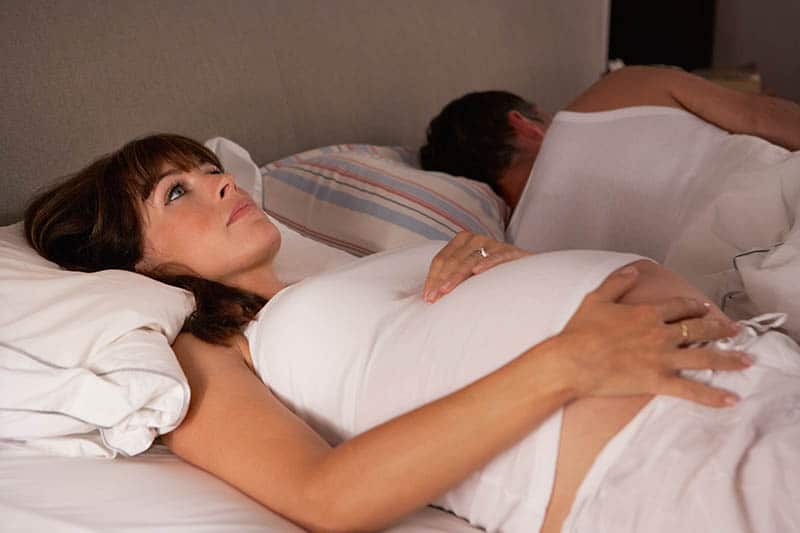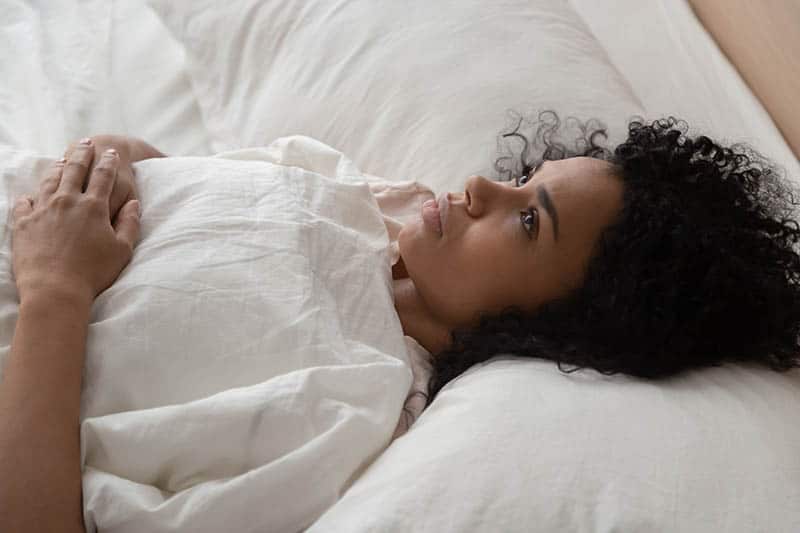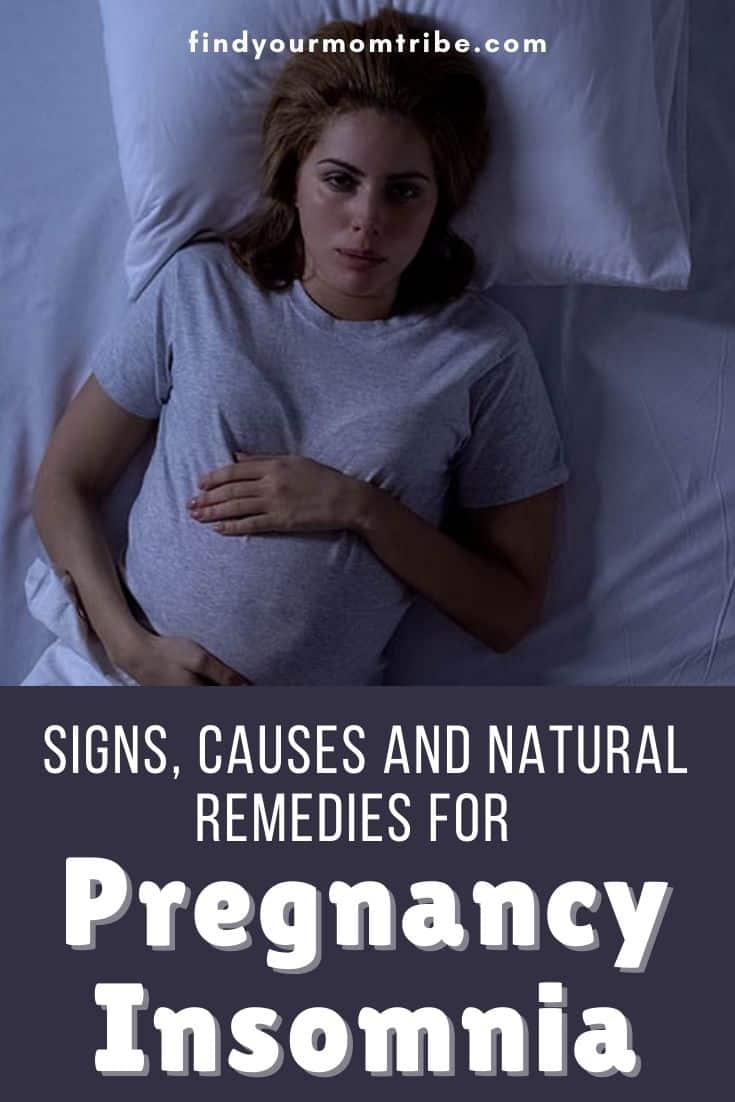You know some of those not-so-good things about being pregnant that no one said to you? Well, I think that pregnancy insomnia is one of the worst for all pregnant women.
No matter what you do to get more comfortable or how tired you really are, you just can’t fall asleep? Or, even worse, you fall asleep but you wake up in the middle of the night and just can’t drift back off? Welcome to the club.
To comfort you, you must know that you aren’t the only pregnant woman who is experiencing sleep deprivation. In 2007, a poll by the National Sleep Foundation showed that 30% of pregnant women and 42% of postpartum women have sleep problems.
Sleep problems and insomnia in pregnancy are something that almost every pregnant woman deals with.
Don’t worry, it’s nothing serious and, like all other pregnancy symptoms, it’ll probably end after some time.
However, I know how exhausting it can be and we all definitely want to try to deal with it as soon as possible to finally get a good night’s sleep.
If you are in the first trimester and you want to know more about pregnancy insomnia, signs of it, what causes it, and the most importantly, how to deal with it, continue reading below.
Early Signs Of Pregnancy Insomnia

1. You frequently wake up during the night.
2. You wake up before the sun comes up.
3. You resort to taking sleep medicine to get a better night’s rest.
4. You feel more sleepy during the day.
What Causes Pregnancy Insomnia?

So, you’re expecting a baby and having trouble sleeping or suffering from some sleep disorders, here are several possible causes of your pregnancy insomnia. It’s important to recognize what keeps you awake during the night and find a way to deal with it before it really starts to negatively affect you or your baby.
1. Pre-birth anxiety
Okay, being pregnant is the most beautiful period in every woman’s life. However, it also comes with some obligations and uncomfortable symptoms.
That’s why anxiety is probably the main reason pregnant women can’t sleep throughout the whole night. Especially in the third trimester, when the due date is close, we just can’t stop worrying about it and wondering if everything will turn out fine in the end.
2. Stress
Mental health issues, like anxiety, depression, and stress, can only bring about problems in pregnancy.
These types of issues usually come from worrying too much about birth and the postpartum period. Stress is such a powerful thing that it can actually increase your blood glucose levels, which may lead to gestational diabetes.
Worrying about the C-section, your late pregnancy, or whatever issues you’re dealing with right now, won’t do you any good. You must understand that by worrying and thinking about it all the time, you won’t achieve anything good.
3. Hunger
Constant hunger is also one of the early symptoms of pregnancy. Many pregnant ladies want to avoid weight gain during the pregnancy, so try different diets or don’t eat anything after 6 pm.
To be clear, we all know you shouldn’t gain too much weight for health reasons, plus it can make the birth a little bit more difficult, but if you do decide to go on a diet, it’s crucial that you first consult with your healthcare provider.
It’s normal to have more of an appetite during pregnancy. If you don’t want to eat anything a few hours before bedtime, you should at least have a light protein snack before sleeping.
If you go to sleep on an empty stomach, it’ll make falling asleep more difficult because you’ll have hunger pangs, which is a way your body alerts you that it needs more nutrients.
4. Bad sleeping position
If your baby is lying in an uncomfortable position, it’ll be more difficult for you to find a comfortable sleeping position and you’ll probably have trouble sleeping throughout the whole night.
However, you can always try to encourage your baby to move. For example, you can walk around the room or ask your partner to gently massage your baby bump and talk to the baby.
5. Nausea
Vomiting and nausea are some of the most common early symptoms of pregnancy, which is why they are so often the cause of sleep problems in the first trimester.
Contrary to popular belief, morning sickness doesn’t necessarily only happen in the morning. It can occur anytime of the day, and sometimes before bedtime, so could definitely disturb your sleep habits.

6. Nighttime heartburn
This is also a very common symptom in pregnancy that could also be the cause for your trouble sleeping. It also happens mostly in the first trimester.
To avoid heartburn, refrain from eating anything spicy or not easy to digest. The best natural way to deal with it is to make yourself a cup of ginger herbal tea to soothe your digestive tract or do some light pregnancy exercises.
7. Hormonal changes
During the period of pregnancy, we go through so many changes physically and emotionally. Our hormones undergo some dramatic changes and it’s not easy to get used to all of it.
For example, one of the most crucial hormones, progesterone, increases significantly during pregnancy and especially during the first trimester.
This influx then affects your levels of melatonin, which is a hormone that helps you fall asleep at night. Progesterone suppresses it, preventing you from having a good night’s sleep.
8. Back pain
The pain in the lower back is sometimes unbearable. It hurts when you walk, when you sit down – it hurts even when we lie down.
Most women ask their healthcare provider for some over-the-counter remedy for back pain, but it would be better if you could solve that problem with a massage or exercise, or to find the most comfortable sleeping position.
9. Leg cramps
This symptom is often experienced in pregnancy, especially in the second and third trimester. It’s most often as a result of the weight gain.
You can exercise, get a massage, or try stretching your legs every time you have a leg cramp. Of course, it’s very important to drink plenty of water during the day and include more magnesium-rich foods in your diet, such as nuts and whole grains. If your doctor gives the go-ahead, you may also wish to take a magnesium supplement.
10. Restless legs syndrome
Doctors and researchers don’t know the actual cause of restless legs syndrome (RLS). Some say it occurs probably because of an uncomfortable sleeping position.
RLS normally hits when you’re in bed and just about to fall asleep, then you get the incredible, involuntary urge to move your legs. Some moms find relief for RLS by getting their partner to massage their legs or by wearing compression socks to ease the discomfort.
11. Sleep apnea
Even though this isn’t a common sleep disturbance during pregnancy, it may sometimes be the cause for sleep problems.
Weight gain and tiredness are the most common causes of sleep apnea. Gestational diabetes is also one of the risk factors. The best remedy for this condition is sleeping on the side because it reduces snoring and also helps you breathe better.
12. Frequent urination
This often joked about symptom of pregnancy is caused by increased levels of progesterone and another hormone called human chorionic gonadotropin (hCG).
While more common in early pregnancy, it also can come back in the third trimester because your baby will be bigger and start pressing on your bladder, which will give you the urge to pee even more often.
Even though that urge is exhausting and annoying, to say the least, you mustn’t ignore it or try to hold it in. If your urine changes color or you notice any other changes, you should contact your healthcare provider.
Pregnancy Insomnia Remedies

Most pregnant women think that the best way to deal with their lack of sleep is by taking some over-the-counter sleeping pills, like Ambien and similar.
However, there are so many natural remedies for pregnancy insomnia that can be far more effective, which I’ve listed here below.
NB: If you do decide to go the medication route, you must first consult with your OB-GYN to see whether it is safe for you and your baby.
• Practice better sleep hygiene
Developing and sticking to a healthy bedtime routine will greatly improve your quality of sleep.
One good practice is to always go to sleep in your bed. Don’t pass out on your couch or some other place in your home.
Try to include some relaxing pre-sleep activities into your routine, such as taking a warm bath or shower. Get into the comfiest pajamas you own and lie down in clean, fresh sheets.
• Fight sleeplessness with herbal tea
Chamomile is probably one of the best teas to help you calm down and fall asleep. It may just be your salvation to finally get some good night’s sleep.
An important tip: Not all teas are considered safe to drink while pregnant, and you should limit the amount of tea you consume. If you’re unsure, rather err on the side of caution and first check with your healthcare provider.
• Try some relaxation techniques
Before you go to bed, try some relaxation techniques that will relax both your body and mind, and help you sleep better and longer.
Take up meditation or yoga.. If you read up on prenatal yoga and its advantages for pregnancy, you’ll really want to give it a go. Trust me, it worked wonders for both my pregnancies!
• Treat your insomnia with cognitive behavioral therapy
Cognitive behavioral therapy (CBT) is a very successful treatment for all kinds of insomnia. It helps you develop some healthy sleep habits and it’s sure to help you finally get a good night’s sleep.
Many hormonal changes can cause sleepiness during the day, which pregnant women have no control over, so they have many naps in the daytime – hence, the insomnia at nighttime.
• Walk more during the day or exercise
Experts from the American College Of Obstetricians And Gynecologists all agree that exercise is great for the pregnancy period and also for postpartum recovery.
It regulates the blood pressure, promotes strength, and reduces what we all hate most in pregnancy: bloating and swelling.
• Find a comfortable sleeping position
Many professionals advise that the best sleeping position for pregnant women is on the left side because of the optimal blood flow to the heart.
If you tried every sleeping position and none is helping you fall asleep, you can try to get more comfortable using a pregnancy pillow, which can also be effective to combat other sleep disturbances like back pain and leg cramps.
In Conclusion
There are several possible causes for pregnancy insomnia, but it’s reassuring to know that there are some natural remedies that will alleviate the problem.
If you’ve tried all these methods and still struggle with sleeping, I’d strongly advise you make an appointment with your obstetrics or gynecology healthcare provider and consult with them about your pregnancy insomnia.
And if you’re worried that your insomnia may be affecting your baby in the womb, don’t be. As pediatric sleep expert, Jodi Mindell Ph.D. says, “Your baby sleeps even when you’re wide awake.”
I know it’s exhausting. I know it’s difficult. I know you’re so tired and sleepy, but I also know that it’ll pass sooner than you think.
By using these simple methods, your sleep problems will soon be a thing of the past, and you’ll be well-rested and ready to be the best mamma you know how!
And oh yes, consider this little pregnancy insomnia as an introductory course for what’s coming after birth – that’s when the real sleep disturbances start!
References:
National Sleep Foundation, “Summary of Findings”, 2007.
American College Of Obstetricians And Gynecologists, “Physical Activity and Exercise During Pregnancy and the Postpartum Period”, April, 2020.
Jodi Mindell Ph.D. “Will my insomnia during pregnancy harm my baby?”
Like this post? Please share or pin it for later. You can also stay in the loop and follow us on Facebook, Instagram or Pinterest.

This post contains affiliate links. Please see our full disclosure for more info.

